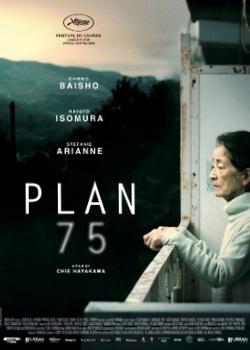Plan 75

Directed by Hayakawa Chie
Cast: Baisho Chieko, Isomura Hayato and Stefanie Arianne
(2022)
Review by Chris Corker
Thirty percent of people in Japan are now over sixty-five, and one in ten is over eighty. Though Malthusian theory on the ills of overpopulation stretch all the way back to the late eighteenth century, the issue of an ageing population is a result of modern society and its impact on human longevity (the average life expectancy in Japan is now just short of 85). New problems necessitate new solutions, but debate over population control is a moral minefield. In artistic terms, how does one treat the topic of ageing populations in a thought-provoking manner, without losing sight of basic humanism?
The answer for Plan 75’s director Hayakawa Chie is to focus on the people affected by this ageing population, and even more so by the policies brought in to remedy it. Amidst increasing violence against the elderly by young people who believe they are burdened with their care, one such pioneering government policy provides the film with its title: “Plan 75”. The content of this new directive is very simple: anyone over the age of 75 may sign up to be clinically euthanised.
The film is divided into three briefly intersecting perspectives: government employee Hiromu deals daily with Plan 75 applications but finds himself conflicted when a family member applies; Filipino nurse Maria takes a job at one of the euthanasia clinics to afford a life-saving operation for her daughter, but finds it hard to separate the bodies from the lives they led; and finally, Michi is a lonely woman in her late seventies who cannot find employment and decides to apply to Plan 75 herself. All three stories are thus connected by imminent death, but more importantly in the context of the film, by imminent death that has been willingly chosen.
While the obvious angle for such a narrative might be to focus on the plight of the elderly living in these difficult conditions, what Hayakawa’s film does especially well is to show the emotional toll Plan 75 takes on the young and old alike. While the terrorist attacks on the elderly are the product of a resentful and disillusioned youth, it becomes clear over the movie’s runtime that the young people tasked with the practicalities of Plan 75 find themselves just as disillusioned with the solution. While the broader view of population relies on anonymous numbers, Hiromu and Maria deal with the human faces hidden beneath the figures. On the applicant’s side, even Michi’s deep loneliness and sense of civic duty are not enough to smooth over the dehumanising efficiency with which the assisted deaths are conducted.
In interviews, director Hayakawa has been keen to stress that she wanted to avoid sentimentality, and while the characters of Plan 75 do have a tendency to stare wistfully out of windows or at sunsets, it is more powerful for its lack of overt melodrama and messaging. The film, however, is also precisely about a troubling lack of sentiment in society. Hayakawa states that the inspiration for Plan 75, initially part of a collection of speculative shorts dubbed Ten Years Japan (2018), was an increasing lack of care in Japan for the disadvantaged, whether the elderly, the poor or the disabled. This indifference thrives when people are reduced to statistics and the evolution of a society is measured only in economic terms. While it doesn’t take a clear side, Plan 75 deftly exhibits some of the emotional difficulties in choosing an extreme strategy to combat an ageing population, even when there seem to be no clear alternatives.
The governmental slogan for Plan 75 is “For our bright future!”, and its sales pitch is the freedom to die on your own terms. And yet the societal pressure to make the “right” choice is ever-present. The government relies on a sense of righteous self-sacrifice to fuel the program, but it is the government itself that has failed to create a society in which the elderly – who are guilty only of being born and living well – can continue to flourish. While other mainstream science-fiction films have tackled a governmental dehumanisation of the marginalised in society – for example, Soylent Green – what is most harrowing about Plan 75 is its feeling of imminent reality. Being on streaming services will open the film up to a wider audience who will likely find it hits just a close to home as it did for domestic viewers. While Japan is the reluctant vanguard meeting this social issue, the questions that Plan 75 raises are ones that we may all have to ask ourselves in the not-so-distant future.

